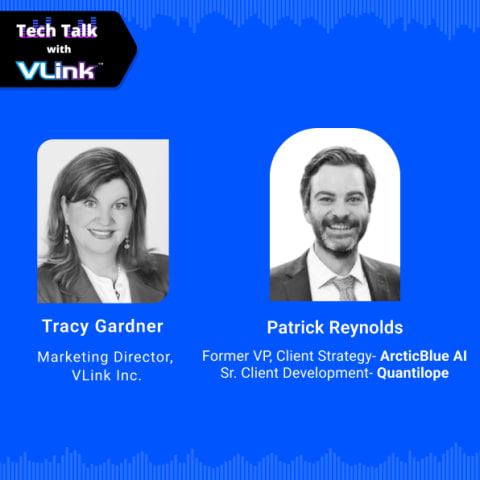The sports industry drives the global economy and continues to thrive in ever-evolving scenarios. According to the report, the sports market was valued at $512.14 billion in 2023 and is expected to reach $623.23 billion by 2027.
While statistical data has long been a critical element in the sports business, one technology is revolutionizing both audience interaction and game strategy, enhancing the entire sports experience. Here, we are talking about the emergence of artificial intelligence in sports.
AI/ML is transforming sports by optimizing player performance, enhancing fan experiences, and revolutionizing game strategies and management. AI-enabled sports apps like Catapult One Smart Vests, HomeCourt, and ESPN have become highly popular for their advanced features in tracking, analyzing, and enhancing sports experiences.
In this blog, we'll explore the diverse ways in which AI is making a profound impact on the sports industry and its future potential, along with real-world examples.
Artificial Intelligence in Sports: Market Overview and Key Statistics
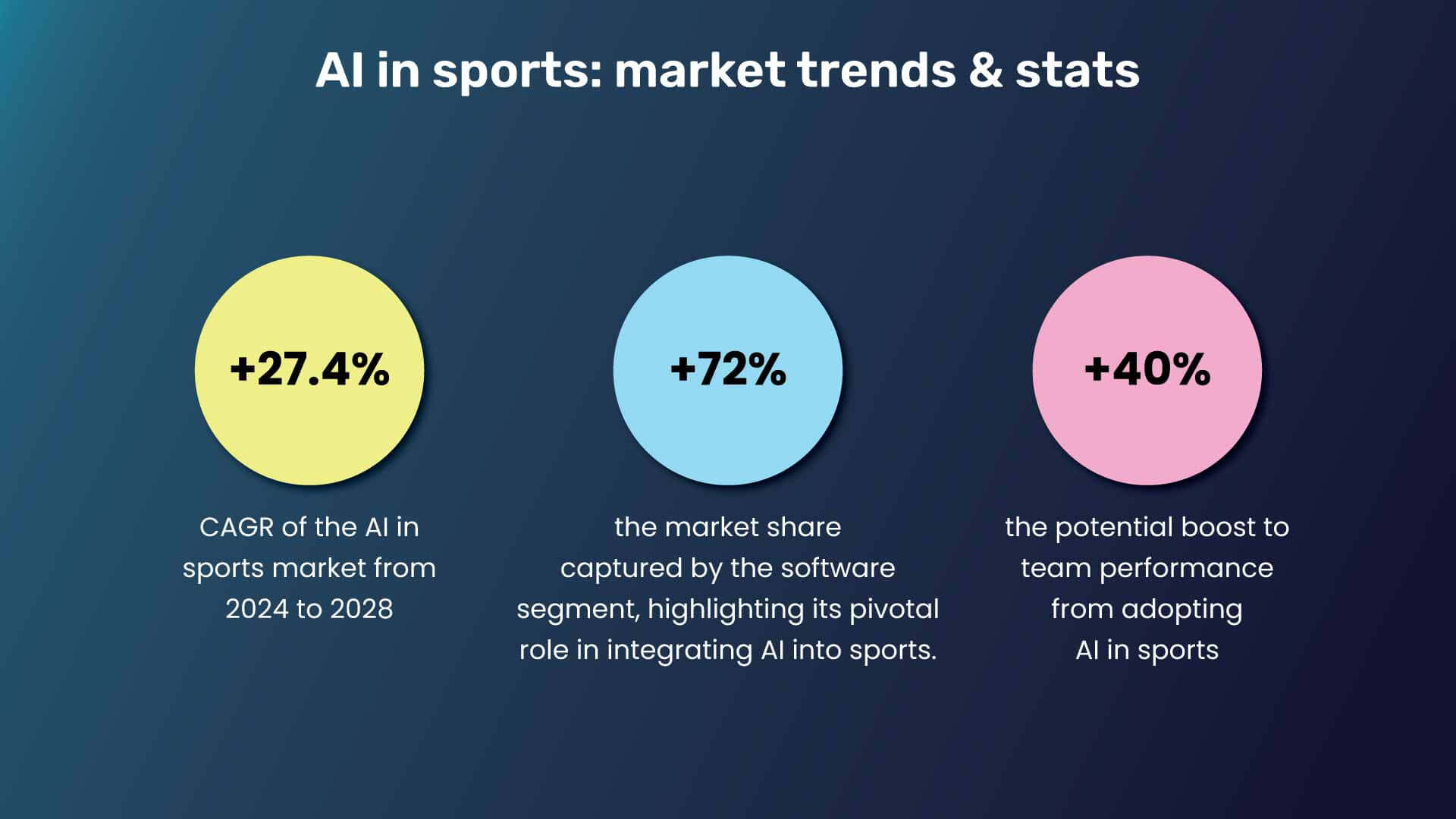
AI in the sports industry has grown exponentially in recent years, driven by the increasing demand for personalized fitness experiences, data analytics, and wearable fitness technology. For instance, the global Artificial Intelligence in the sports market is projected to reach $6.69 billion by 2028, with a growing CAGR of 28.8%.
This growth demonstrates that the global market of AI integration for digital transformation within the sports industry continues to expand. More sports teams, broadcasters, and technology companies are adopting AI field, specific machine learning in sports.
Other key factors influencing the market growth of AI sports are rising demand for data-driven decision-making, personalized fan experiences and advancements in AI and machine learning.
In 2023, North America dominated the market with over 39% share, fueled by a robust technological infrastructure and significant investments in AI research. Europe followed closely, with a strong focus on sports technology and AI, particularly in the UK, Germany, and France.
The above data proves how artificial intelligence impacts the sports industry, making it information rich. Not just popular games but certain sports enterprises depend on AI and machine learning to drive their business.
If you're part of this trend, understanding AI applications in sports is key before diving into specific case studies. Let's take a quick look at how AI is transforming the sports industry.
The Role of AI in Sports Business
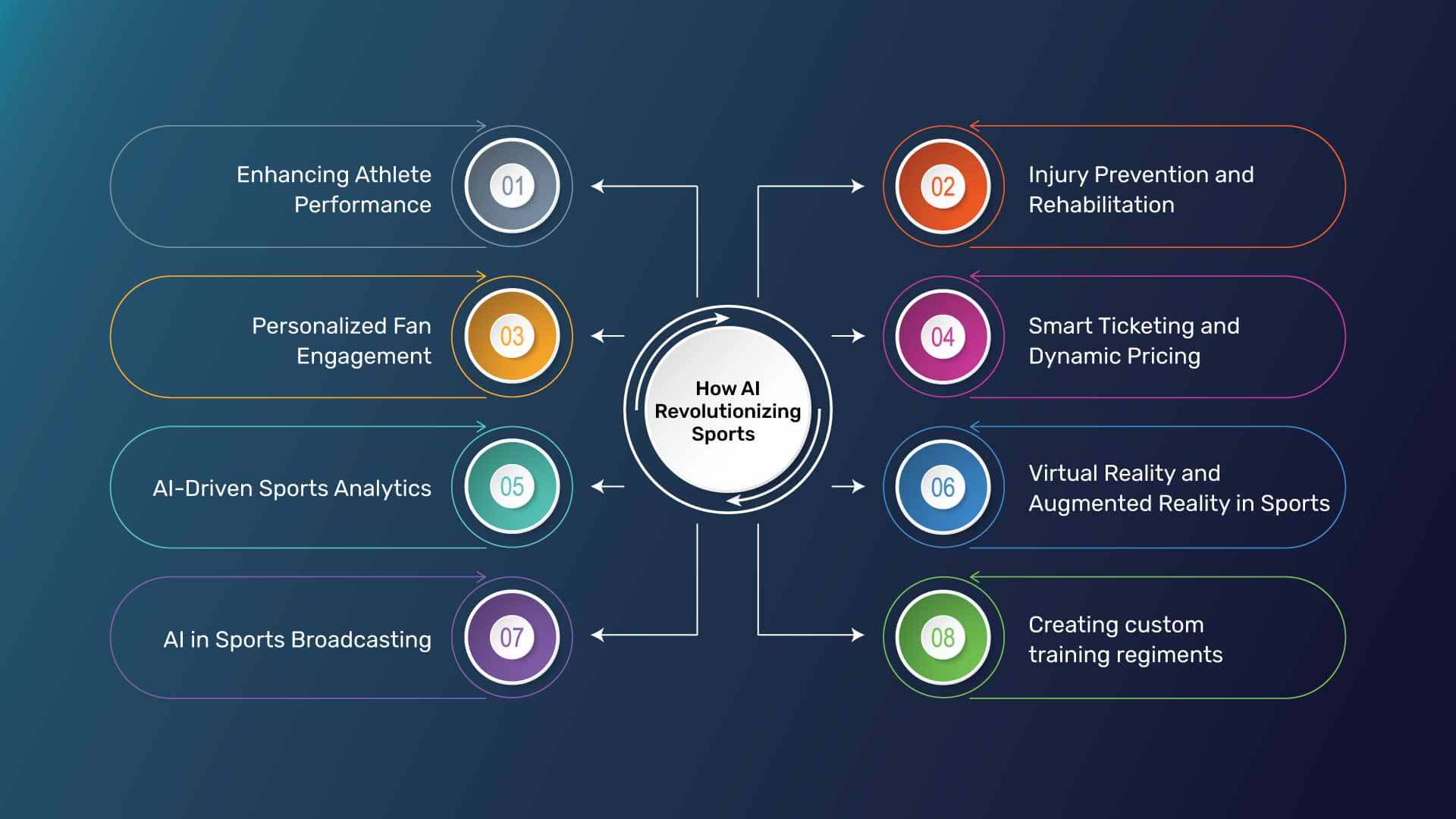
From improving athlete performance to intelligent ticketing, AI and sports go hand in hand, redefining the industry in various forms. Here are a few ways in which artificial intelligence is revolutionizing the sports industry and driving it toward digital transformation.
Enhancing Athlete Performance and Training
AI is helping athletes push their boundaries and achieve peak performance through data-driven insights. By gathering information from wearables, sensors, and video analysis, AI-powered platforms track an athlete's movements, training load, and recovery.
In 2023, data interpretation and analysis led the way, capturing over 34% market share, as data-driven insights proved essential for boosting athletic performance.
This data enables coaches and sports scientists to create tailored training plans, optimize performance, and reduce the risk of injury. With real-time feedback on technique, athletes can refine their skills instantly, improving their game on the field.
AI algorithms monitor vital metrics—such as speed, heart rate, endurance, and biomechanics—providing a comprehensive, real-time view of an athlete's physical condition and performance.
Key AI applications in Sports:
- Wearables and sensors: Devices like heart rate monitors, GPS trackers, and motion sensors collect data that AI can analyze to detect patterns and optimize training schedules.
- Biomechanical analysis: AI-powered software can analyze an athlete's form and technique, identifying areas for improvement or potential injury risks.
- Predictive analytics: By using AI to analyze historical performance data, coaches can predict how athletes will perform under specific conditions or against opponents.
Injury Prevention and Rehabilitation
Injuries remain a crucial concern in sports, but AI is introducing innovative solutions for prevention. The adoption of artificial intelligence for athlete health monitoring and injury prevention is predicted to be valued at 25% by 2024.
By leveraging data analytics in sports industry, AI allows teams to monitor an athlete's training intensity, biomechanics, and health metrics to foresee potential injury risks. By identifying patterns of strain or overexertion, AI pinpoints vulnerable areas and helps teams take preventative action.
Additionally, AI supports rehabilitation by tracking recovery progress and creating individualized recovery plans tailored to an athlete's specific needs. This forward-thinking approach reduces downtime and promotes sustained athlete health, especially in high-intensity sports where physical strain is a constant challenge.
Key AI applications in Sports:
- Predictive modeling: AI can detect signs of overtraining, fatigue, or physical strain, predicting potential injuries before they happen and enabling preventive action.
- Rehabilitation: AI monitors athletes' progress during recovery, ensuring that rehabilitation programs are tailored to everyone's needs. It can also help track recovery metrics, providing real-time feedback to medical professionals.
Personalized Fan Engagement
AI is transforming fan engagement in sports, enabling teams and brands to create highly personalized experiences. Using AI-driven tools, organizations can customize interactions and content based on individual fan preferences. AI chatbots enhance customer service by providing real-time updates, answering questions, and sharing match details.
Additionally, machine learning in sports analyzes fan behavior to suggest tailored content, like highlight videos, special ticket offers, and merchandise deals. With a virtual AI assistant app development, you can enrich the fan experience, fostering more engaging and relevant communication that strengthens the bond between fans and their favorite teams.
Key AI applications in Sports:
- Chatbots and virtual assistants: AI-powered chatbots can provide real-time updates, answer fan questions, and offer personalized recommendations based on fan behavior.
- Content personalization: AI systems analyze fan behavior to deliver personalized content, such as tailored game highlights, player statistics, and news updates.
- Virtual reality (VR) and augmented reality (AR): AI enables immersive fan experiences through VR and AR, offering interactive features like virtual stadium tours, real-time stats overlays during games, and 360-degree video content.
Smart Ticketing and Dynamic Pricing
AI is changing sports ticketing domain by offering more innovative, more efficient sales strategies. Through AI-powered dynamic pricing, ticket costs can be adjusted in real time according to demand, opponent caliber, weather conditions, and even fan sentiment on social media.
This approach maximizes revenue for teams while offering fans fair and responsive pricing. Additionally, AI enhances security by detecting counterfeit tickets and preventing unauthorized resale, ensuring fans a reliable and safe ticketing experience.
Key AI applications in Sports:
- Dynamic pricing: AI algorithms analyze market data, such as ticket demand, opponent strength, weather conditions, and even social media activity, to adjust prices dynamically.
- Fraud prevention: AI-powered systems can detect counterfeit tickets and prevent fraudulent activities in the ticketing process.
- Ticket recommendations: AI tools can suggest tickets to fans based on their previous purchases or preferences, offering a personalized and streamlined ticket-buying experience.
AI-Driven Sports Analytics
AI-driven sports analytics is transforming how teams assess performance, both during and after games. By leveraging video analysis, AI tracks player movements, identifies patterns, and measures critical metrics like speed, distance, and positioning. This data empowers coaches to refine strategies, evaluate team dynamics, and analyze opponents' strengths and weaknesses.
Moreover, AI aids in forecasting future performance, optimizing tactics for upcoming games, and enhancing overall team management.
Key AI applications in Sports:
- Game analysis: AI-powered video analysis tools can break down game footage to track player movements, team formations, and critical moments. This data helps teams evaluate performance, study opponents, and create game strategies.
- Player tracking: AI systems can track player positioning, speed, and decision-making during games, providing valuable insights into player behavior and game dynamics.
- Team optimization: By using AI to analyze individual and team performance data, coaches can make informed decisions about lineups, tactics, and substitutions during matches.
Virtual Reality and Augmented Reality in Sports
AI is also merging with Virtual Reality (VR) and Augmented Reality (AR) to provide immersive experiences for both athletes and fans. In training, VR allows athletes to simulate game scenarios, allowing them to rehearse strategies and hone their skills in a virtual environment.
For fans, AR provides enhanced experiences in the stadium by overlaying real-time stats, player information, and interactive features onto the live action. Fans can use AR on their mobile devices to receive instant feedback and personalized content during live events, creating a more engaging and interactive fan experience.
Key AI applications in Sports:
- Training and Simulation: VR immerses athletes in real-game scenarios, enhancing skills and decision-making in a risk-free environment.
- Fan Engagement: AR offers interactive features like real-time stats and virtual experiences, while VR allows fans to enjoy games from unique perspectives.
- Performance Analysis: VR and AR provide coaches with detailed 3D visualizations to assess player movements, biomechanics, and progress.
AI in Sports Broadcasting
The sports broadcasting technology market was valued at $71.27 billion in 2023 and is predicted to reach $101.04 billion by 2028, with a CAGR of 7.3%.
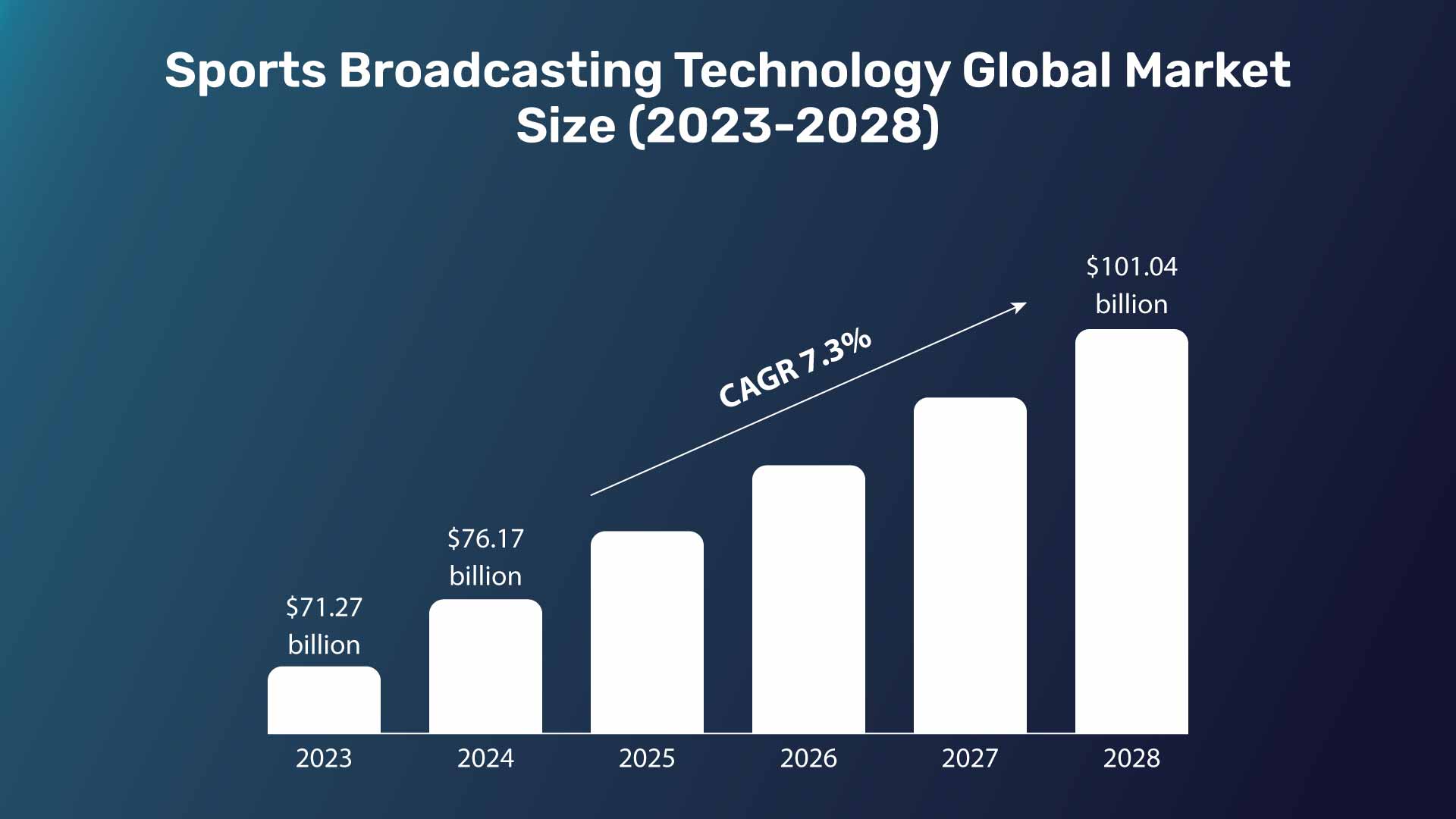
AI is transforming sports broadcasting by automating content creation and improving live coverage speed and accuracy. AI tools can generate match highlights, track specific players, and create real-time summaries, reducing broadcasters' workload.
Additionally, AI systems personalize content for viewers by analyzing their preferences and providing tailored highlights, statistics, and analysis, which boosts fan engagement and keeps viewers connected to their favorite sports.
Key AI applications in Sports:
- Automated highlights: AI tools can automatically detect critical moments, such as goals, tackles, and assists, creating instant highlights for fans.
- Real-time content creation: AI can generate match summaries, analyze game trends, and produce personalized content for viewers during live broadcasts.
- Enhanced video analysis: AI can track specific players or moments in a game, offering fans a more customized and engaging viewing experience.
AI and machine learning have proven beneficial for all the sports areas mentioned above. To discuss them in detail, here is a range of artificial intelligence use cases in the sports market.
Real-World Examples of Artificial Intelligence in the Sports Industry
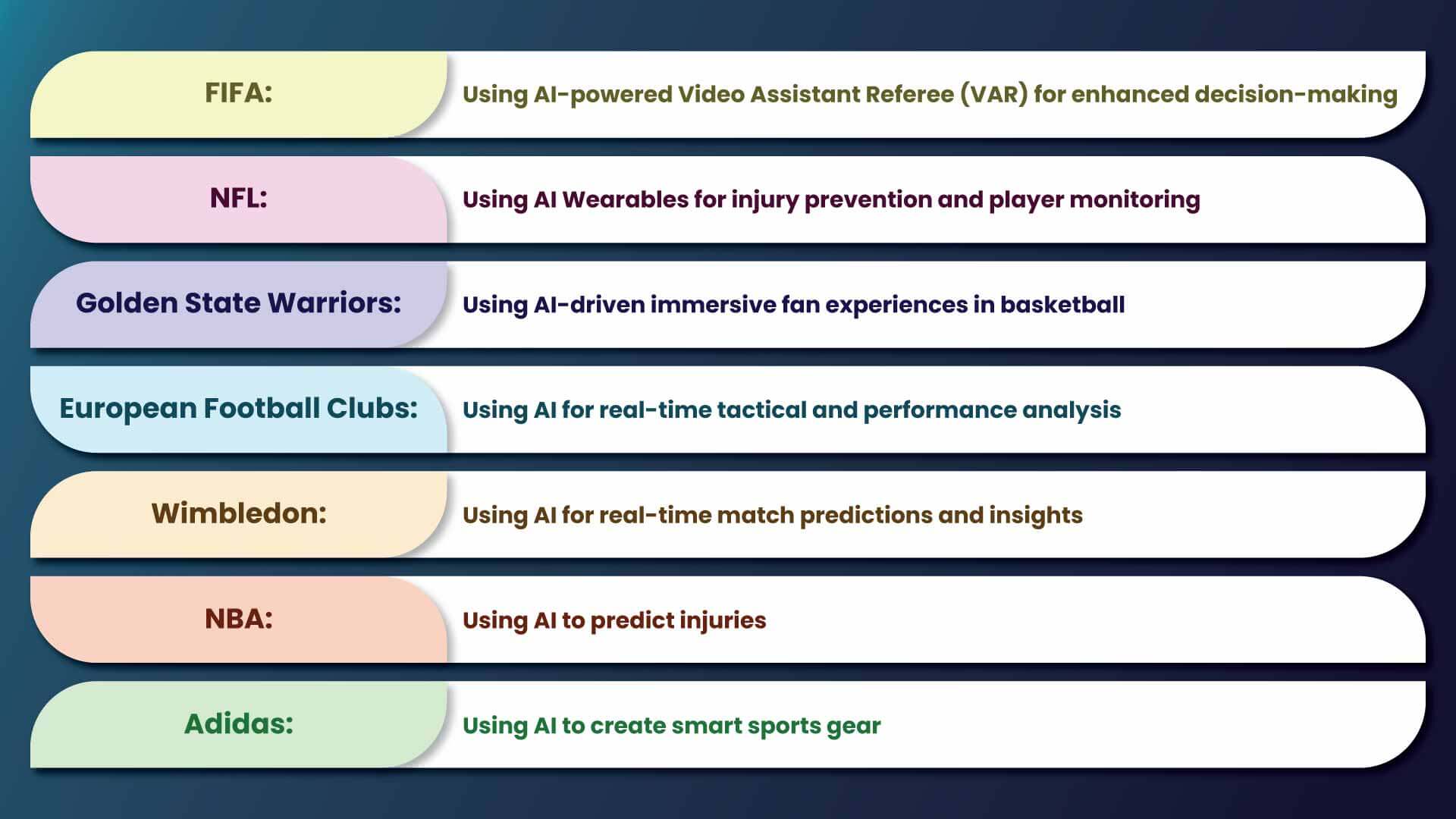
AI is revolutionizing the sports industry in numerous ways, from improving player performance to enhancing fan experiences. Below are real-life examples of how leading companies revolutionizing their sports business with artificial intelligence technology.
Example 1 - FIFA’s AI-powered Video Assistant Referee (VAR) for Decision Making
FIFA employs AI-powered VAR to help referees make accurate decisions during football games. By analyzing video footage in real-time, this system helps officials assess fouls, offside calls, and goals. VAR technology ensures greater accuracy in decision-making, reducing human error during crucial moments in matches and enhancing fairness in matches.
Example 2 - NFL teams using AI wearables for injury prevention and player monitoring
NFL teams are increasingly adopting AI-powered wearables to monitor players' fatigue, heart rates, and movement patterns. These wearable devices gather real-time data that helps coaching staff and medical teams identify injury risks and adjust training plans, optimizing player health throughout the season.
Example 3 - Golden State Warriors using AI for immersive fan experiences.
The Golden State Warriors leverage AI technologies like augmented reality (AR) and virtual reality (VR) to create immersive fan engagement at games. It allows fans to experience games from different angles, interactive game replays and virtual meet-and-greets with their favorite players.
Example 4 - European football clubs using AI for real-time performance analysis
European football clubs, including the English Premier League and La Liga, are using AI to analyze live game footage and track player positions and team formations. It offers coaches valuable insights into the opposition's tactics and potential weaknesses.
This real-time data allows coaches to adjust their strategies and improve in-game decision-making.
Example 5 - Wimbledon using AI for real-time match predictions
Wimbledon, one of tennis' most prestigious tournaments, uses Artificial Intelligence to provide fans with real-time match predictions and detailed insights through its “Likelihood to Win” feature. AI algorithms analyze players' historical performance, court conditions, and real-time data to predict potential outcomes during matches, enhancing viewer engagement.
Example 6 - NBA using AI to predict injuries
NBA teams incorporate AI to predict potential injuries before they occur, resulting in enhanced player health management and performance. AI models analyze patterns and early signs of overuse or stress, which allows teams to make preventive adjustments in training to reduce the risk of injury, ultimately extending players' careers.
Example 7 - Adidas using AI to create intelligent sports gear
Adidas is leveraging AI to innovate sports gear, designing smart clothing, footwear, and the “miCoach” smart ball. This technology tracks and analyzes player performance during practice and helps players fine-tune their skills by offering personalized feedback on their gameplay.
Challenges and Ethical Considerations in AI Adoption for Sports Companies
With the ever-evolving applications of Artificial Intelligence in sports, there also comes a set of challenges that need to be addressed efficiently. These challenges range from cybersecurity concerns to fairness and transparency.
Privacy & Security Concerns
The massive amount of data generated by AI systems, such as athlete performance metrics, fan interactions, and user behavior, raises significant privacy and security issues. AI systems in sports often rely on personal information that can be vulnerable to breaches.
Ensuring the safety of sensitive data, implementing robust encryption protocols, and complying with data protection regulations (like GDPR) are essential for safeguarding the privacy of both athletes and fans.
Fairness and Bias
AI models can unintentionally perpetuate biases if the data used for training is not representative of the full spectrum of athletes, teams, or demographics.
For example, suppose an AI system analyzes athlete performance data, but the dataset is skewed toward a particular gender, race, or age group. This can lead to unfair assessments or recommendations.
Sports companies must ensure that AI models are trained on diverse, unbiased data sets and are continuously audited for fairness.
Transparency
AI systems in sports, particularly those used for decision-making in areas such as player recruitment, game strategy, and fan engagement, must be transparent in their operations. It's crucial that stakeholders—athletes, coaches, fans, and regulatory bodies—understand how AI systems make decisions and predictions.
Lack of transparency can lead to mistrust and confusion, especially when results are questioned or contested. Ensuring explainability in AI models is critical to maintaining integrity in their application.
Data Accuracy Issues
AI systems heavily depend on the quality and accuracy of data. In sports, where minor mistakes can lead to significant consequences, any inaccuracy in data collection or analysis can negatively impact decisions made by coaches, teams, or even fans.
For example, inaccurate player performance data might lead to improper player evaluations or injury management. Companies must ensure that the data collected is of the highest quality and that AI systems are tested for reliability.
Addressing these challenges will require sports & gaming organizations to prioritize ethical considerations, transparency, and continuous oversight for efficient and fair AI-enabled sports development solutions.
The Future of AI in the Sports Industry
The future of AI in the sports industry holds exciting potential across various domains, from enhancing performance analysis to transforming fan experiences. The role of AI in sports will continue to expand, creating more efficient, immersive, and data-driven experiences for athletes, teams, and fans.
For sports organizations and stakeholders, embracing AI technology is no longer optional—it's essential for staying competitive in the modern sports landscape. So, if you're in the same business, don't wait to invest in AI sports app development solutions to stay ahead in the market.
Get AI-Integrated Sports App Development from VLink!
VLink offers AI-integrated sports app development that enhances user experience, boosts engagement, and delivers more brilliant insights. From providing personalized recommendations and real-time analytics to implementing AI-driven interactive features, we have got you covered. Our expert team uses the latest technologies to create successful apps for your sports or gaming business.
Partner with VLink and revolutionize your sports app with AI-driven innovation. Talk to our AI/ML experts today.









 Shivisha Patel
Shivisha Patel





